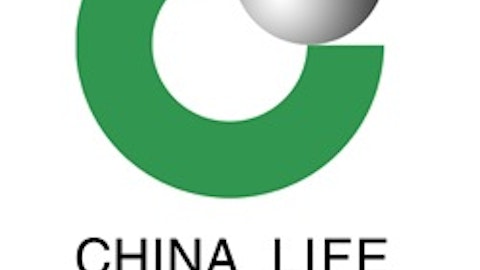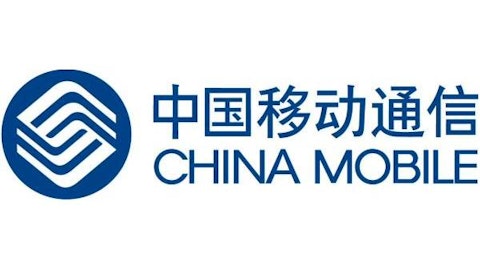Overall mobile penetration in China stands at 75%, which is lower than other large emerging economies like Mexico and Brazil, where penetration is well over 80%.
The TD-SCDMA (TD) technology is an air interface developed in China in an attempt to avoid dependence on Western technology. However, in January 2009, the Government assigned licences for different 3G mobile phone standards to three carriers. TD was assigned to China Mobile Ltd. (ADR) (NYSE:CHL) while licences for the W-CDMA were assigned to a subsidiary of China Unicom (Hong Kong) Limited (ADR) (NYSE:CHU) and to China Telecom Corporation Limited (ADR) (NYSE:CHA).
All three have very healthy financial positions, so pursuing growth opportunities should not be a problem.
The giant
The largest mobile carrier in the world, China Mobile Ltd. (ADR) (NYSE:CHL), currently has 64% of Chinese mobile market share. The Chinese government controls over 71% of the company.
The carrier enjoys unrivaled scale efficiency, strong brand recognition, and greater network coverage than any of its peers. A strong brand is especially useful to attract and retain high-spending subscribers.
In recent years, China Mobile Ltd. (ADR) (NYSE:CHL) has struggled to grow its 3G services as it is based on a less mature technology: TD. This means slower network speeds compared to rivals and less attractive handset selection. To the company’s relief, number portability has not been implemented in China. Also, competition for subscribers, especially in the profitable but saturated urban markets, has intensified, which forced the company to seek subscriber growth in lower-income rural areas.
Despite these challenges, China Mobile Ltd. (ADR) (NYSE:CHL)’s ability to stay competitive is not in question. It has been installing WiFi hotspots in major cities to improve connection speed for subscribers. Also, the company recently announced that it plans to spend around $6.7 billion to build out its 4G LTE network. This is a significant move, allowing the firm to take a step closer to a deal that wouldintroduce the iPhone on the TD network, which would allow it to increase it share in 3G phones, currently at 13%.
Competition is rising
China Unicom (Hong Kong) Limited (ADR) (NYSE:CHU) is the second-largest mobile carrier in China. Its state-owned parent company owns more than 70% of shares.
Mobile services account for nearly half of China Unicom (Hong Kong) Limited (ADR) (NYSE:CHU)’s total revenue. The company’s future depends on whether it can successfully execute in the 3G race to expand its subscriber base, and gain better scale efficiency, based on the W-CDMA technology. This won’t be an easy task.
While China Mobile Ltd. (ADR) (NYSE:CHL) currently has the largest number of high-spenders on mobile services, rivals like China Unicom (Hong Kong) Limited (ADR) (NYSE:CHU) may take advantage of the numerous frustrated China Mobile Ltd. (ADR) (NYSE:CHL) 3G subscribers, whose main complaints are slow connection speeds and a dearth of handset selection options. Still, lack of number portability makes it hard for subscribers to move from one company to another. A wide selection of W-CDMA handsets help China Unicom (Hong Kong) Limited (ADR) (NYSE:CHU) appeal to Chinese subscribers.
The other half of China Unicom (Hong Kong) Limited (ADR) (NYSE:CHU)’s revenue is derived from fixed-line and broadband services, although it’s not management’s main focus at the moment.
China Telecom: Dominant position in Southern China
Another strong competitor is China Telecom Corporation Limited (ADR) (NYSE:CHA), an integrated telecom service provider. It operates the largest wireline network in China and serves over half of China’s broadband access subscribers. The government controls over 70% of its shares.
China Telecom Corporation Limited (ADR) (NYSE:CHA) officially entered the wireless market after acquiring the CDMA business from China Unicom in 2008 and launched its 3G services a year later. Offering plans that bundle mobile service with fixed-line and broadband access, China Telecom Corporation Limited (ADR) (NYSE:CHA) has successfully converted a significant number of mobile subscribers from rival carriers. Investment in network infrastructure and marketing campaigns also played an important role in narrowing the gap with rivals.
For instance, although China Mobile and China Unicom enjoy better scale efficiency and stronger branding, China Telecom Corporation Limited (ADR) (NYSE:CHA) has managed to double its overall mobile market share to 14% over the past two years and gain control of a third of the 3G market.
China Telecom Corporation Limited (ADR) (NYSE:CHA) has a very important advantage in southern China: a monopoly in the fixed-line telephone and broadband markets. Its fixed-line network is so extensive that makes it almost impossible to duplicate. Although the fixed-line business now faces increasing competition from wireless services, its position in broadband access services remains unchallenged.
Bottom line
Although growth in the mobile market will be slower than the double-digit rates registered in previous years, there is still room for growth as penetration rate is 75%. I believe China Mobile is the most interesting choice and investors will be rewarded in the long run. Its unrivaled scale efficiency, strong brand recognition, and greater network coverage should ensure a continuous flow of funds and growth in profits over the years. Competition is rising, but China Mobile is keeping up.
The article The Great Potential of Telecom Operators in China originally appeared on Fool.com and is written by Damian Illia.
Damian Illia has no position in any stocks mentioned. The Motley Fool owns shares of China Mobile. Damian is a member of The Motley Fool Blog Network — entries represent the personal opinion of the blogger and are not formally edited.
Copyright © 1995 – 2013 The Motley Fool, LLC. All rights reserved. The Motley Fool has a disclosure policy.




